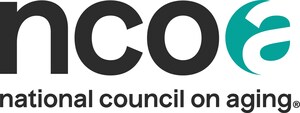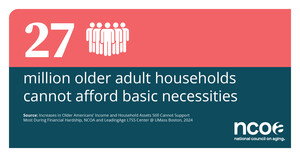-- New Campaign, in Partnership with United Health Foundation, Stresses that Hearing Loss is a Family Affair
-- May is Better Hearing Awareness Month and Older Americans Month
WASHINGTON, May 15, 2012 /PRNewswire-USNewswire/ -- Jacqueline Holton and her husband, Lynn, of Hudsonville, Mich., were always active and social, and even taught line dancing at their local community center. But when Jacqueline started noticing more than just "selective hearing" issues with her husband, she urged him to get a hearing test. Jacqueline decided to get tested, too. As it turned out, her hearing was worse than her husband's.
(Logo: http://photos.prnewswire.com/prnh/20100615/NCOALOGO)
Stories like this are common among older adults, as hearing loss affects 9 million seniors in the United States today. It's one of the most common health problems in the country – but also one of the most under-diagnosed and undertreated.[1]
May is Better Hearing Awareness Month and Older Americans Month, and the National Council on Aging (NCOA), with support from United Health Foundation, is educating older adults about the signs of hearing loss, the importance of getting screened, and providing answers to frequently asked questions and reasons to get help. To learn more, visit www.ncoa.org/HearingLoss.
"One out of every four older Americans has undetected or untreated hearing loss, and NCOA's research has shown that most older adults with hearing loss do not realize how much the quality of their lives has been affected," said Jim Firman, president and CEO of NCOA. "As someone with significant hearing loss, I can personally attest to how the right hearing aids have dramatically improved my ability to work and play, my relationships with family and friends, and my self-esteem. We encourage all older adults and their families to take a hearing test and find out what they've been missing."
A 1999 NCOA survey on hearing loss and older adults found that when people began to use hearing aids, many saw improvements in their lives, including their family relationships (66 percent), mental health (36 percent), sense of independence (34 percent), social life (34 percent) and even sex life (8 percent).
"The National Council on Aging has a terrific track record of working to improve the lives of seniors in the United States, and this initiative is no different," said Kate Rubin, president, United Health Foundation. "With hearing loss affecting a quarter of all seniors, this outreach campaign has the potential to improve the health, and the lives, of millions of older Americans."
"In recent years, hearing aids have improved significantly because of digital technologies," said Firman. "Therefore, we think people who use hearing aids today will see even more significant improvements in their lives."
Thanks to their fitted hearing aids, Jacqueline and Lynn continue to lead an active and social life. Watch a video of their story online, read through the research, and find more information about hearing loss at www.ncoa.org/HearingLoss.
[1] 1999 Study "The Consequences of Hearing Loss in Older Adults" conducted by the Seniors Research Group, an alliance between The National Council on Aging and Market Strategies, Inc.
About United Health Foundation
Guided by a passion to help people live healthier lives, United Health Foundation provides helpful information to support decisions that lead to better health outcomes and healthier communities. The Foundation also supports activities that expand access to quality health care services for those in challenging circumstances and partners with others to improve the well-being of communities. After its establishment by UnitedHealth Group [NYSE: UNH] in 1999 as a not-for-profit, private foundation, the Foundation has committed more than $193 million to improve health and health care. For additional information, please visit www.unitedhealthfoundation.org.
About NCOA
The National Council on Aging is a nonprofit service and advocacy organization headquartered in Washington, DC. NCOA is a national voice for millions of older adults—especially those who are vulnerable and disadvantaged—and the community organizations that serve them. It brings together nonprofit organizations, businesses, and government to develop creative solutions that improve the lives of all older adults. NCOA works with thousands of organizations across the country to help seniors find jobs and benefits, improve their health, live independently, and remain active in their communities. For more information, please visit: www.ncoa.org |www.facebook.com/NCOAging | www.twitter.com/NCOAging
SOURCE National Council on Aging
WANT YOUR COMPANY'S NEWS FEATURED ON PRNEWSWIRE.COM?
Newsrooms &
Influencers
Digital Media
Outlets
Journalists
Opted In






Share this article